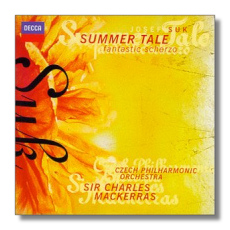
The Internet's Premier Classical Music Source
Related Links
- Suk Reviews
- Latest Reviews
- More Reviews
-
By Composer
-
Collections
DVD & Blu-ray
Books
Concert Reviews
Articles/Interviews
Software
Audio
Search Amazon
Recommended Links
Site News
 CD Review
CD Review
Josef Suk

- Summer Tale, Op. 29
- Fantastic Scherzo, Op. 25
Czech Philharmonic Orchestra/Charles Mackerras
Decca 466443-2
Josef Suk (1874-1935) wrote Summer Tale, subtitled a "Musical poem", in the period of 1907-09, when he was still recovering from the deaths of his wife, Otylka, in 1905, and of his father-in-law, Dvořák, in 1904. This work is somewhat less grief-laden than the Asrael Symphony that preceded it by a couple of years, and it sounds neither ahead of nor behind its time. Its expressive language is sophisticated, its orchestration assured, both components uniting to augur, in more ethereal moments, sections of the Firebird, and both sounding less Czech and more cosmopolitan than you might think from this disciple and son-in-law of Dvořák. True, there are elements of Richard Strauss and even Mahler here, but Suk's brew contains ingredients mainly from his own unique recipes. You'll find that Summer Tale is a colorful, worthwhile work, with an undercurrent of tension and tragedy, even in its more subdued passages. Yet, there are also consolation and hope, an acceptance of fate.
Its five movements are subtitled thusly: Voices of life and consolation; Noon; Intermezzo – Blind musicians; In the power of phantoms; and Night. The outer movements are the longest, totaling nearly a half-hour together in this fifty-minute work, and they are probably the most substantive of the five, as well. Suk is quite successful in capturing the moods and images of his subtitles. Thus the intense heat of the summer "Noon" is effectively depicted with shimmering strings and lazy tempos, and Night comes across as nocturnal, all right, but also with affirmation via an ending that suggests sunrise will come again and again.
The Fantastic Scherzo (1903) is a brighter and closer to a more traditional Czech sound. Its bustling energy, colorful scoring and attractive tunes make for a surefire hit. In both works, Mackerras, known especially for his fine Janáček opera performances and recordings over the years, has the discriminating sense to know not to plumb too deeply for the Czechishness in the Summer Tale, though he does rightly highlight the folkish qualities in the Fantastic Scherzo. He turns in superb readings of both works, and I must say I find his work in other repertory of late – Shostakovich, in particular – to be most convincing. The Czech Philharmonic is in fine form here and Decca's sound is sumptuous. Recommended.
Copyright © 2000, Robert Cummings




















